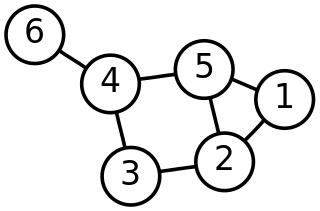
In topology and related branches of mathematics, a connected space is a topological space that cannot be represented as the union of two or more disjoint non-empty open subsets. Connectedness is one of the principal topological properties that are used to distinguish topological spaces.

Discrete mathematics is the study of mathematical structures that are fundamentally discrete rather than continuous. In contrast to real numbers that have the property of varying "smoothly", the objects studied in discrete mathematics – such as integers, graphs, and statements in logic – do not vary smoothly in this way, but have distinct, separated values. Discrete mathematics therefore excludes topics in "continuous mathematics" such as calculus or Euclidean geometry. Discrete objects can often be enumerated by integers. More formally, discrete mathematics has been characterized as the branch of mathematics dealing with countable sets. However, there is no exact definition of the term "discrete mathematics." Indeed, discrete mathematics is described less by what is included than by what is excluded: continuously varying quantities and related notions.
In topology and related branches of mathematics, a Hausdorff space, separated space or T2 space is a topological space where for any two distinct points there exist neighbourhoods of each which are disjoint from each other. Of the many separation axioms that can be imposed on a topological space, the "Hausdorff condition" (T2) is the most frequently used and discussed. It implies the uniqueness of limits of sequences, nets, and filters.

In mathematics, topology is concerned with the properties of a geometric object that are preserved under continuous deformations, such as stretching, twisting, crumpling, and bending; that is, without closing holes, opening holes, tearing, gluing, or passing through itself.
In mathematics, a topological space is, roughly speaking, a geometrical space in which closeness is defined but cannot necessarily be measured by a numeric distance. More specifically, a topological space is a set of points, along with a set of neighbourhoods for each point, satisfying a set of axioms relating points and neighbourhoods.
In topology and related branches of mathematics, Tychonoff spaces and completely regular spaces are kinds of topological spaces. These conditions are examples of separation axioms.
In topology and related branches of mathematics, a normal space is a topological space X that satisfies Axiom T4: every two disjoint closed sets of X have disjoint open neighborhoods. A normal Hausdorff space is also called a T4 space. These conditions are examples of separation axioms and their further strengthenings define completely normal Hausdorff spaces, or T5 spaces, and perfectly normal Hausdorff spaces, or T6 spaces.
In topology and related fields of mathematics, a topological space X is called a regular space if every closed subset C of X and a point p not contained in C admit non-overlapping open neighborhoods. Thus p and C can be separated by neighborhoods. This condition is known as Axiom T3. The term "T3 space" usually means "a regular Hausdorff space". These conditions are examples of separation axioms.
Division or divider may refer to:
In topology and related branches of mathematics, a topological space X is a T0 space or Kolmogorov space (named after Andrey Kolmogorov) if for every pair of distinct points of X, at least one of them has a neighborhood not containing the other. In a T0 space, all points are topologically distinguishable.
In topology and related branches of mathematics, separated sets are pairs of subsets of a given topological space that are related to each other in a certain way: roughly speaking, neither overlapping nor touching. The notion of when two sets are separated or not is important both to the notion of connected spaces as well as to the separation axioms for topological spaces.

In mathematics, general topology is the branch of topology that deals with the basic set-theoretic definitions and constructions used in topology. It is the foundation of most other branches of topology, including differential topology, geometric topology, and algebraic topology. Another name for general topology is point-set topology.
In topology, a discipline within mathematics, an Urysohn space, or T2½ space, is a topological space in which any two distinct points can be separated by closed neighborhoods. A completely Hausdorff space, or functionally Hausdorff space, is a topological space in which any two distinct points can be separated by a continuous function. These conditions are separation axioms that are somewhat stronger than the more familiar Hausdorff axiom T2.
Lists of mathematics topics cover a variety of topics related to mathematics. Some of these lists link to hundreds of articles; some link only to a few. The template to the right includes links to alphabetical lists of all mathematical articles. This article brings together the same content organized in a manner better suited for browsing. Lists cover aspects of basic and advanced mathematics, methodology, mathematical statements, integrals, general concepts, mathematical objects and reference tables. They also cover equations named after people, societies, mathematicians, journals and meta-lists.
The history of the separation axioms in general topology has been convoluted, with many meanings competing for the same terms and many terms competing for the same concept.
In topology, a proximity space, also called a nearness space, is an axiomatization of the intuitive notion of "nearness" that hold set-to-set, as opposed to the better known point-to-set notion that characterize topological spaces.
Separation property may refer to:

In topology and related fields of mathematics, there are several restrictions that one often makes on the kinds of topological spaces that one wishes to consider. Some of these restrictions are given by the separation axioms. These are sometimes called Tychonoff separation axioms, after Andrey Tychonoff.




